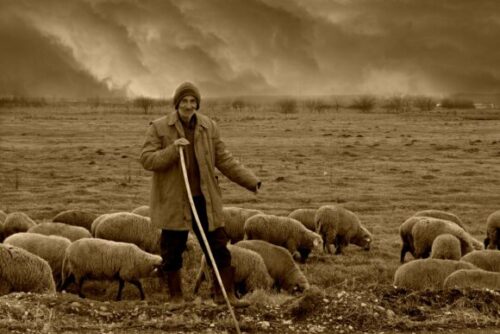Psalm 23
The Lord is my shepherd, I shall not want…
The word “pastor” is not often mentioned in the KJV Bible. A pastor is a shepherd.
What is a pastor? What would a real shepherd be like?
A pastor is gentle. He knows sheep, and he knows his sheep. He would never mistake a sheep for a goat. (Even most city slickers wouldn’t do that!)
A shepherd loves his sheep. He doesn’t want to hurt them, but protects them. His rod and staff are comforting, so they must not be used to beat sheep. The staff may be used to reach a sheep in a tight spot, but not to hurt the sheep. A shepherd never deliberately hurts a sheep, but if a sheep is hurt he also must never leave the sheep, wounded and bleeding, alone. If a sheep is hurt, he will bind its wounds.
If a sheep leaves the fold, the shepherd goes and looks for it and brings it back- he doesn’t ignore the fact that it has gone or say it left so it has to find its own way back. If a sheep from another fold finds its way to him, he will keep it, feed it, heal it, and protect it. He will also go out of his way to deliver it to the rightful owner if possible.
A shepherd will defend his flock. He will put himself in danger to fight bear or wolf so that his sheep stay safe. He mourns the death of a sheep. The Bible talks about the shepherd fighting for the sheep and pulling the bits that are left out of the beast’s mouth. (Amos 3:12) Each sheep is special to him. He takes his duties seriously.
A shepherd is humble. There is nothing about his job that demands praise or glory. The shepherd was generally the youngest son, and shepherding was considered lowly work. Shepherds aren’t braggarts. They simply do their jobs. They receive very little thanks for their work, and expect no thanks.
Feeding the sheep is one of the shepherd’s priorities. He knows the best fields, and leads them there. He never drives them, always leads them. He knows the clearest streams, and leads them to the food, water, and rest they need to be healthy and strong.
Sheep are not accountable to the shepherd, but the shepherd is accountable for the sheep. He doesn’t expect a report from each sheep every day, week, or month on what they ate or did with their days. Sheep are sheep. They do sheep things. He knows by looking at them which sheep are prospering and which may need extra attention. He gives that attention and care gladly; it’s part of his job, and no sheep has to beg for it.
A shepherd keeps count of the sheep and makes sure none are left behind. If a sheep is lost, the shepherd doesn’t blame the sheep; he takes responsibility for its loss himself. He finds it if he can, taking the time and effort to retrace his steps, calling and searching for it until he finds it and brings it home.
Sheep feel safe with their shepherd. They can relax in his presence, yet they trust his watchfulness and care enough to wander from him, eating and drinking. They don’t herd around him, scared he will leave. Sheep under a good shepherd aren’t afraid. They know the shepherd is watching and that he cares for them.
I have a shepherd. His name is Jesus.
Ps 23
1 The LORD is my shepherd; I shall not want.
2 He maketh me to lie down in green pastures: he leadeth me beside the still waters.
3 He restoreth my soul: he leadeth me in the paths of righteousness for his name’s sake.
4 Yea, though I walk through the valley of the shadow of death, I will fear no evil: for thou art with me; thy rod and thy staff they comfort me.
5 Thou preparest a table before me in the presence of mine enemies: thou anointest my head with oil; my cup runneth over.
6 Surely goodness and mercy shall follow me all the days of my life: and I will dwell in the house of the LORD for ever.
John 10:14 I am the good shepherd, and know my sheep, and am known of mine.
(see all of John 10)
1 Peter 5:2 Feed the flock of God which is among you, taking the oversight thereof, not by constraint, but willingly; not for filthy lucre, but of a ready mind;
3 Neither as being lords over God’s heritage, but being ensamples to the flock.
1 Timothy 3:2 A bishop then must be blameless, the husband of one wife, vigilant, sober, of good behaviour, given to hospitality, apt to teach;
3 Not given to wine, no striker, not greedy of filthy lucre; but patient, not a brawler, not covetous;
4 One that ruleth well his own house, having his children in subjection with all gravity;
5 (For if a man know not how to rule his own house, how shall he take care of the church of God?)
6 Not a novice, lest being lifted up with pride he fall into the condemnation of the devil.
7 Moreover he must have a good report of them which are without; lest he fall into reproach and the snare of the devil.
8 Likewise must the deacons be grave, not doubletongued, not given to much wine, not greedy of filthy lucre;
9 Holding the mystery of the faith in a pure conscience.
10 And let these also first be proved; then let them use the office of a deacon, being found blameless.
See also Jer 23
http://web.archive.org/web/20110107211859/http://rockymountainministries.org/Articles/MythBusterArticles/Myth31%20The%20Shepherd%20Breaks%20The%20Legs%20Of%20His%20Sheep.html
http://www.sheep101.info/sheepbible.html












